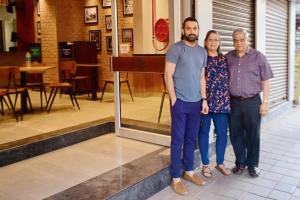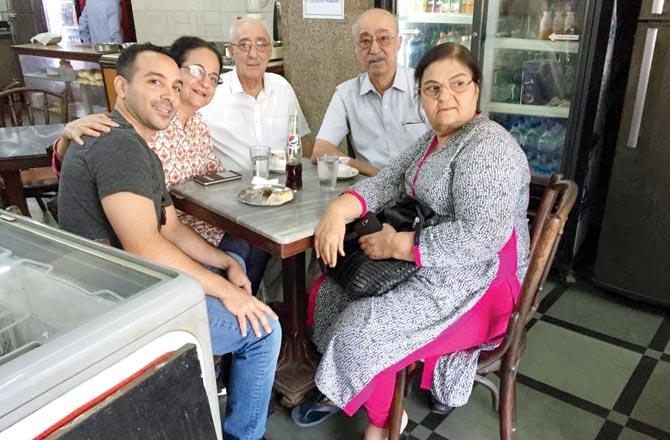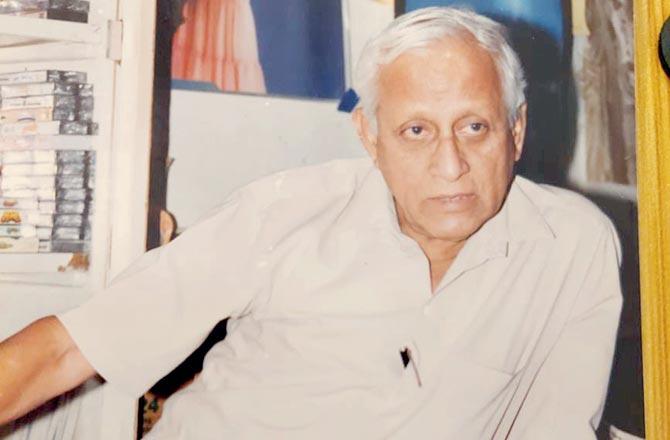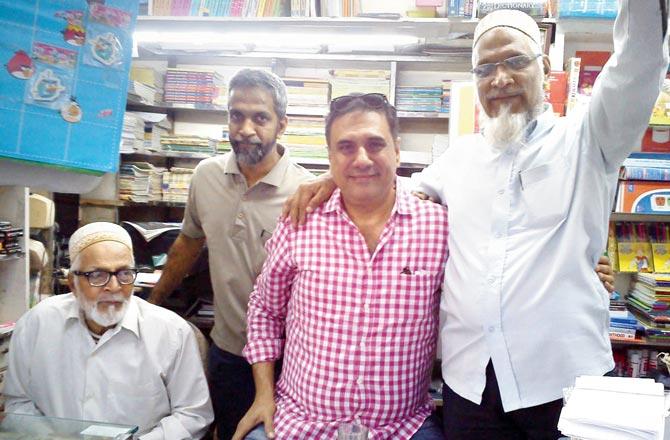With Byculla Restaurant being replaced by Burger King, locals recall the heyday of other haunts in the hood

Jehangir Mistry with wife Firdaus and son Shahen outside what used to be Byculla Restaurant, opening soon as a Burger King branch. Pic/Bipin Kokate
 Wendy's: no better wool till there are better sheep." Which knitter could resist the sweeping assurance of that tagline? Piled skeins of the British brand flew off shelves of filmmaker Rafeeq Ellias' grandfather's haberdashery. Mohammed Joosab Ellias opened Amir Store on Clare Road, in East Byculla, around 1945, naming the shop after his son Amir.
Wendy's: no better wool till there are better sheep." Which knitter could resist the sweeping assurance of that tagline? Piled skeins of the British brand flew off shelves of filmmaker Rafeeq Ellias' grandfather's haberdashery. Mohammed Joosab Ellias opened Amir Store on Clare Road, in East Byculla, around 1945, naming the shop after his son Amir.
This was a street elegant as the eminence it acknowledged. John Fitzgibbon, second Earl of Clare, Governor of Bombay from 1831 to 1835. North-ended by the Y-flyover, Clare Road is ushered in by the statue of "Khada Parsi" Cursetjee Manockjee, who offered Indian girls the first English school in 1859 from his home, Villa Byculla. The road is rechristened Mirza Ghalib Marg, though it is debatable whether or not the legendary poet lived hereabouts. But a definite lodger at 17A Adelphi Chambers, in the 1940s, was the Urdu writer Saadat Hasan Manto.
ADVERTISEMENT

The Ferzandi brothers at Byculla Restaurant in 2018: Riaz Turner and his grandparents Zarine and Darius Ferzandi, with Plumarz and Parvin Ferzandi. Pic courtesy/Gilan Ferzandi
Amir Stores had embroidery materials, sewing needles, hosiery, lingerie, lace, ribbons (exposed rubber-bands on ponytails punishable by nuns of convents on the road), and long johns reaching the knees to offset short hemlines bolder schoolgirls flaunted. Along with Tootal ties, Coats colour-graded thread and Wendy's wool, white gloves were purposefully picked for celebratory and solemn occasions.
Buzzing at Xmas and New Year, the shop didn't close till midnight mass was done. People dashed in for gloves worn to dances. And funerals year long, thanks to two undertakers. Frank Binks and Edward Jones preceded John Pinto's services on the street. The flashy Jones hearse wryly pitched: "Have your last ride in a Rolls Royce." Kids slyly queried, "How's business Mr Jones?" Just for his classic reply, "Very bad, no bastards are dying."

Abraham Moses, proprietor of 1940s-established Our Musical Salon, at the popular Clare Road store in the 1990s. Pic courtesy/Razon Moses
An icon since 1945, Byculla Restaurant is the latest in a string of closures on Clare Road and Dr BS Ambedkar Road it extends from. "It was my adda with colony pals for time-pass over maska pao chai, chilli omelette and lassi," Jehangir Mistry of Rustom Baug remembers.
Gilan Ferzandi's grandfather, Kaikhushru Merwan Zainabadi fled 1920s Iran, covering inclement kilometres on foot and donkey back. Changing his surname to Ferzandi at the legendary Dr Hormasji Masina's suggestion, he introduced Byculla Restaurant & Bakery at Alexandra Terrace, managed by his son Darius. His other son Plumarz tended Byculla Pharmacy.

The late Jaffer Khilawala, his sons Murtaza and Zulfikar (extreme right) with good friend Boman Irani at Jaffer Book Stall. The actor's family-run Golden Wafers was a neighbouring shop where the Khilawalas bought their favourite cheese and garlic chips. Pic courtesy/Zulfikar Khilawala
It was decided to pull down the restaurant shutters ahead of Plumarz and Darius' recent deaths, says Plumarz's son Gilan. "My father and uncle spent hours in the cafe, watching the world go by. With margins thinning and no question of compromising on quality of ingredients like flour, mince and onion, Darius wanted to hang up his boots professionally. The brothers believed an honoured customer is not king, he's God. Patrons put food on our table, so no indulging in malpractice."
More than a century old, Alexandra Terrace stands at the junction signalling Victoria Road (Sant Savla Marg), leading in from delicate-spired Gloria Church to Masina Hospital and Rustom Baug. Super-cop Julio Ribeiro was an Alexander Terrace resident from age 12 to 24 when he enrolled with the IPS. Modestly describing himself "a little above average in studies and below average in games", Ribeiro rode the Mazagaon tram to Dhobi Talao daily. He was the eldest of four children his mother was widowed with at just 26. As she conversed exclusively in Portuguese and Konkani, he learnt English at St Xavier's School.
"Moving to Alexandra Terrace in 1941 from Colaba, we found it mainly tenanted by Anglo Indians who worked for the Railways," he recalls. "We organised Anglo Indians versus Goans hockey matches on the ground between Alexandra Terrace and Albion Place." That was the plot where Hotel Heritage was opened in 1968 by Picasso-inspired artist-architect Jehangir Vazifdar, who chose never to sell any canvas he painted.
Living in the Byculla Restaurant building meant nothing much to Ribeiro, a vegetarian by choice. What did excite him were Sundays at Palace Cinema across. A year after Imperial Movietone released Alam Ara, India's first talkie, the "picture palace" was unveiled in 1932 by film distributor MB Billimoria and BD Bharucha, a chemist with Kemp & Co. The partners first met at the Bhikha Behram holy well in Churchgate.
Film writer Rafique Baghdadi relished reel upon reel of Roy Rogers and Burt Lancaster starrers on the then Thursday holiday from school. "Catching the morning show at Palace, we gobbled Regal Restaurant's kheema samosas and ran to the 2 pm Alexandra Cinema screening. The other great contribution to young lives in Bombay was circulating libraries. I eagerly awaited Photoplay-type magazines Jaffer Book Stall supplied." A Gloria High School girl adds, "Jaffer's was where we starved readers rushed to from school, before the unruly hordes of Anza (Antonio DeSouza High School) descended."
Puppy love struck the boys of Christ Church School and Anza with girls of CJM (Convent of Jesus and Mary) and St Agnes. Dating couples nibbled raisin buns fresh from E Hiscock's ovens. Cake shops like Silvana further fuelled romantic rendezvous. Distanced sweethearts made three-minute calls from Irani cafe phones. CJM wild child Hutoxi Turel did at Lucky Moon—"I STD-called my Surat boyfriend in every lunch break, wickedly paying local rates. I think the gentleman at the galla knew but said nothing."
It was an age of kind proprietors. Our Musical Salon aired requests dedicated to objects of affection for 50 paise per song. Listening in cubicles to everything from sappy ballads to sultry jazz, some '60s kids are grateful to Abraham Moses, now 97. Waiving the half-rupee if it strained pocket money allowances, he pointed out new records of personal preferences.
Our Musical Salon came to Star Mansion on Clare Road of the 1940s with MA Moses, whose wife Sheba was a familiar sight at the counter. Their affable son Abraham kept track of hundreds of individual client tastes. The shop attracted a potpourri of communities in skirting neighbourhoods. Special Christmas mailers contacted a broad customer base of Nagpada Jews, Mazagaon Catholics and Cantonese Chinese, besides Byculla Bohris, Anglos and Europeans.
"My father ordered 500 LPs at a time of hit '70s groups like ABBA and Boney M," says Abraham Moses' son Razon, of the decade he joined the enterprise. "Dad had terrific rapport with music dealers like the Curmallys of Rhythm House. Minimally competitive, music stores shared stocks if someone ran out."
Stocking UK-published textbooks for ISC students, too, Our Musical Salon coped with a start-of-term scramble to snag sets before they sold out. Ditching such academic prescriptions, teens thrilled instead to Presley and the Beatles, frequenting BBC, the Irani restaurant with a jukebox. At the tiny "Indian Chinese" eatery next to it, they devoured stacked comic books and the ubiquitous American chop suey topped by desi fried eggs.
Naughty Christ Church School boys asked teachers, "Miss where do you live?" Grinning at the shyly whispered response, "Love Lane". Lovers indeed strolled through this bungalow-lined, tree-shaded stretch from Byculla police station to Mazagaon Circle, formerly Seth Moti Shah Road,commemorating the merchant-philanthropist. Its name even earlier was a mouthful: Low Level Road North of Falkland Road Overbridge.
A happy complicity unfolded between the pyaaliwala from Azamgarh and Johnny sherbet wala from Kerala. The former scooped passersby deliberately over-spiced liver and potato masala mixed in kokum juice, garlic oil, mirchi and chutney. His fiery concoction took them gasping to Johnny's cooling juices, especially the watermelon flavour he was famed for.
Another trick was practised in the mezzanine "family room" of Cobana, confectioners credited with deliciously stuffed hot-cross buns. Darkish, cramped, the space was conducive to amateurly effective sleight of hand. In days you paid exactly for pieces eaten from a serving platter, boy gangs finished the chicken filling, leaving deceptively intact the outer patty crusts.
Cobana witnessed strange exchanges in its initial avatar as Victoria Bar owned by Zend Lakdavala's grandfather. "Soldiers in wartime didn't always have money for drinks. In lieu they left unusual memorabilia—accordion-like expandable cameras, a Winchester pump action .22 rifle. Cobana was soon contracted to Tony D'souza & Company," says Lakdavala from Las Vegas where he is a writing specialist in the College of Southern Nevada. He has authored the compelling Man Manque: A Memoir of Sorts, outlining a bitter coming of age in Bombay.
More memories flood in from Byculla boys and girls…of Walter the brown-haired hairdresser, a star attraction at Chee's saloon till Tham arrived around 1950. The seekh-botiwala near Best Restaurant. The Rodrigues' outlet, nicknamed Beediwala, selling stationery and forbidden sweets at the CJM gate, with the Fernandes' Turf Laundry thereabouts. Greeting cards from Fakhruddin's. Byculla's largest Christmas star suspended between second-floor levels of Lobo Mansion and Haroon Court. Small noses pressed on glass panes of Rogers soft drinks factory, fascinated by bottles of ginger ale, soda, lemonade, pineapple and raspberry assembled cheek by jowl on machines.
In the middle of the Alexandra Terrace compound, Father Christmas once sat centre-stage this time each year. All swagger in a stylish Plymouth convertible packed with presents, his ebullient Ho-ho-hos echoing wide. It's going to be the quietest season, Santa.
Author-publisher Meher Marfatia writes fortnightly on everything that makes her love Mumbai and adore Bombay. Reach her at meher.marfatia@mid-day.com/www.mehermarfatia.com
Keep scrolling to read more news
Catch up on all the latest Mumbai news, crime news, current affairs, and a complete guide from food to things to do and events across Mumbai. Also download the new mid-day Android and iOS apps to get latest updates.
Mid-Day is now on Telegram. Click here to join our channel (@middayinfomedialtd) and stay updated with the latest news
 Subscribe today by clicking the link and stay updated with the latest news!" Click here!
Subscribe today by clicking the link and stay updated with the latest news!" Click here!







